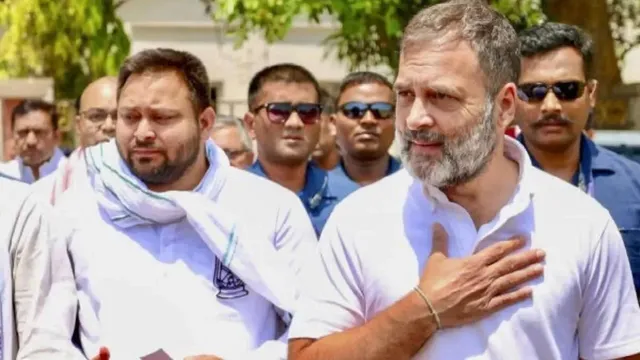- By Akansha Pandey
- Fri, 14 Nov 2025 01:38 PM (IST)
- Source:Jagran News Network
The crushing defeat of the Grand Alliance (Mahagathbandhan) in the Bihar Assembly Election 2025 is not merely a matter of seat tallies, but a cumulative result of failures in strategy, leadership, coordination, and a neglect of the ground reality. This loss sends profound signals on multiple levels.
The assembly election results highlight the crisis in opposition politics and the internal rifts within the Grand Alliance, which caused it to fall far behind in the race for power. The question now is, what are the five main reasons for the alliance's defeat that led to the failure of Lalu's political heirs?
1. Lack of Leadership and Coordination: The Grand Alliance's biggest weakness was its unstable leadership structure.
- The disputes between the RJD and Congress over leadership, coordination and the face of the campaign were perceived by the public and voters from the initial phase.
- At a time when parties should be working on everything from seat-sharing to campaign strategy, the Grand Alliance's constituent parties were entangled in internal squabbles over seat allocation and candidates for Chief Minister and Deputy Chief Minister.
- Tejashwi Yadav also proved to be a failure in terms of strategy. Although he held election rallies across the state, he was completely unsuccessful in formulating a solid, coordinated strategy with alliance partners on issues and seats.
2. Miscalculation of Caste and Social Equations: In Bihar's politics, social equations are not just about numbers; they are linked to trust and on-the-ground delivery.
- The Grand Alliance used caste arithmetic with overconfidence but failed to understand social changes and new equations.
- A new political consciousness was emerging among the lower and backward classes, which the NDA capitalised on more effectively.
- The Grand Alliance could not establish a hold among women voters, first-time young voters, and non-traditional caste groups.
- The opposition was banking solely on its old vote banks to win the election, while the electorate was looking for new issues, new faces and stable leadership.
3. Congress's Weak Link and Internal Strife: Despite being a major pillar of the Grand Alliance, Congress consistently proved to be a burden in this election.
- There was significant resentment within the party over ticket distribution. The selection of wrong candidates in several constituencies upset local equations.
- The working style of in-charge leaders like Krishna Allavaru caused dissatisfaction among party workers.
- Deep differences over seat sharing between the RJD and Congress persisted from beginning to end, resulting in a united front that appeared weak, fragmented, and unconvincing.
- Congress's weak ground machinery and erratic campaigning proved detrimental to the Grand Alliance.
4. Failing to Set the Narrative on Issues: The Grand Alliance was completely unsuccessful in setting the electoral agenda.
- Although major issues like employment, inflation, education and agriculture were raised, the required narrative could not be built.
- In contrast, the NDA aggressively communicated its model of development, law and order and stable government to the public.
- The Grand Alliance's message reached voters in a scattered and unclear manner.
- Tejashwi Yadav's rallies also saw a repetition of old promises, which failed to inspire confidence in a new direction among the youth.
5. Candidate Selection,Organisational Laxity and Local Discontent: The alliance's third major problem was the inactivity of its organisation at the local level.
- The Grand Alliance failed to mobilise its workers in time in many areas. Even in many of the RJD's traditional strongholds, booth management was weak.
- In constituencies where candidates were changed, local discontent emerged openly.
- The public neither recognised nor accepted many of Congress's candidates.
- The Grand Alliance also failed to woo and attract young people and women.
This crushing defeat for the Grand Alliance has made it clear that elections are not won merely on old equations, slogans or alliances. The keys to victory are strong leadership, organisational activity and a clear political narrative. In this election, the Grand Alliance lost the so many things that made it strong: its equations, strategy, understanding and grassroots connect. If the opposition hopes to make a comeback in the future, it will have to take deep corrective action in these five areas.

